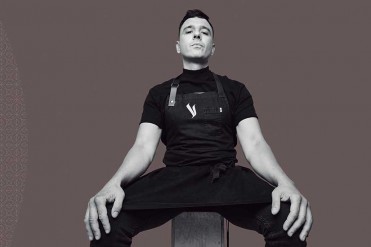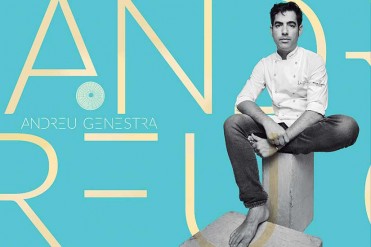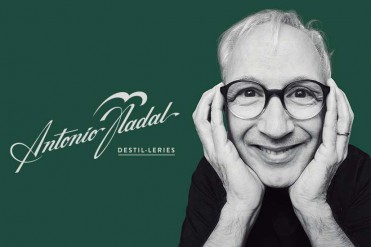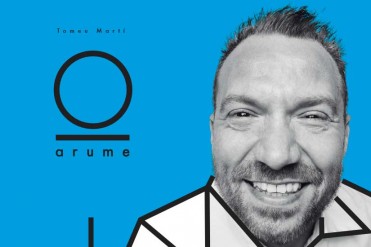
David Rivas
David Rivas (1988, Isla de Margarita, Venezuela) isn’t your typical chef. After training at the Hoffman School in Barcelona and working in some of the finest kitchens in the world, his restaurant Terrae, in Puerto de Pollensa, aims to go right back to the beginning. He has brought back ancestral cooking techniques and follows an entirely sustainable approach based on two key principles: zero waste (making the most of each product) and only using local produce. Making this possible is the greatest creative challenge Rivas has faced in his career. And the result? An honest menu and a leitmotif that goes beyond food. Or in his words: “a bold, sustainable, and wild ‘protest restaurant’.”
What’s David Rivas like inside and outside the kitchen?
I’m a very creative person. I’m always having weird ideas... The David in the kitchen is a bit more passionate about what he’s doing, he’s more intense. When I’m outside the kitchen, I really enjoy painting, going to the mountains, I love travelling...
At Terrae you “worship the land”. How do you achieve that?
Terrae is a restaurant that aims to be as sustainable as possible. We use different tools to achieve it, such as zero waste, which basically means “whichever product comes in, we use absolutely all of it”. We even try to use parts that people think are inedible: shells, seeds... Another way we worship the land is by using local produce: at Terrae we only use products from Mallorca, and have taken things so far that, for example, there is no coffee, pepper, or soy sauce at our restaurant. Our aim is to support the local economy and to make money stay here. Terrae is a ‘protest restaurant’; we know it’s extreme, but we want to prove that it’s possible.

How would you describe the protest at Terrae?
We want to prove that it’s possible to have a restaurant business that is more sustainable in terms of the environment, workers... For us, sustainability means not wasting all these things that are around us.
Sustainability is the hot topic on everyone’s lips these days. Do you think it is really being applied?
Sustainability is a trend. I learned about it in Nordic countries, in Scandinavia, in Norway to be specific. The chefs who created new Nordic cuisine were the forerunners of this approach, and then it became fashionable. I love the fact it’s a trend. Because the more people who join the movement the better, even if they can’t do it all the time or take it as far as us. I’d rather people were talking about it. I like to take things to the extreme, see how far my creativity can go if I throw myself completely into this. I see it as a creative challenge.
How do you put this philosophy into practice?
In lots of ways. Our lamb is a good example: before, we slow-cooked it in the Roner, then vacuum-packed it in plastic. It always came out perfectly, but we saw that huge number of plastic bags and eventually I realised it didn’t make sense: we were trying to reduce our use of plastic and our rubbish bin was full of bags. So, I suggested using other, old techniques, like confits, marinades, curing... Now, we make the same lamb by putting it on a grill with the leftover embers, using lamb fat that we recycle. It’s really complicated because you have to know exactly how many embers to use, then we leave it cooking all night and check on it the next day. It’s trial and error, until you hit on the exact timings so that you cook it exactly like people used to, so it’s preserved at a low temperature without using bags.

You’re going back to the roots of cooking...
Yes. Exactly. The idea is to go back to the roots. It seems like everyone is inventing lots of new things these days. Instead of doing that, at Terrae we remember all the things that have already been invented. We don’t want to forget about the future, but want to remember that there are lots of things from the past that were really practical.
You describe Terrae as a “bold, sustainable, and wild” concept...
It’s especially wild. I’ve come from working in really “posh” kitchens where I learned a ton of things, but also unlearned others... At Terrae, I’ve taken the good bit from that, and want to make it a casual restaurant. For example, we play cumbia in the bathroom, the chefs don’t wear jackets...
What is the Terrae menu like?
The menu is based on everything that the farmers and fishermen have to offer us at a particular time. We change it, although it always follows the same outline. And from that starting point, I change the menu depending on what the farmers have. Also, sometimes, if they have a product that is about to go off, I buy it and try to create something to use it up. Sometimes they give me five watermelons and, to save them from being wasted, I make a watermelon fermentation, or I dry it... That way we always come up with new things...
What do your customers say about the concept?
The problem is that I don’t really know how to explain everything I do to the customer because I’m too focused on making it happen. Sometimes the customer isn’t aware of everything that goes on behind what they see on their plate. Things like the fact we’ve stopped using gas at the restaurant: everything is cooked with ecological firewood. I’d like customers to understand that I’m not just using Terrae to stroke my own ego as a chef (so that the food is good and people like it), I’d like them to see that I want to leave something far more important behind in terms of society and the environment.

What’s your main motivation?
I’m really motivated to move forwards with this project because I think it’s really lovely and I want to share it, with all the challenges that it involves.
How do you feel about all the recognition you’ve earned?
It makes me feel proud to be recommended in important and famous guides like the Michelin and Repsol guides, it highlights the value of our food. You eat really well at Terrae, but to be honest, what I’m most proud about is the Save the Med certificate we won this year, a Plastic Free Certificate. Having that seal of environmental quality is much more the essence of Terrae.
What is your goal for Terrae over the next few years?
I’m very optimistic. There are lots of things we can keep on doing. We’re constantly evolving. For example, I’d like to find someone from Mallorca who makes ecological dishwasher soap, start to make my own flour, my own soy fermentations, alga nori with alga from Mallorca...
How do you live the Terrae philosophy in your daily life?
I try at home, although I don’t manage to take it to such an extreme. It’s difficult to buy things that don’t come in a plastic bag, or go out for a beer with your friends and find a local beer... You go to other restaurants that you enjoy and they’re not how you’d like them to be, but you have to be able to live in this world of ours without going crazy.






